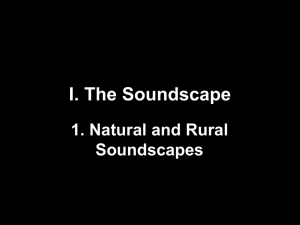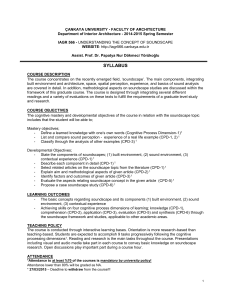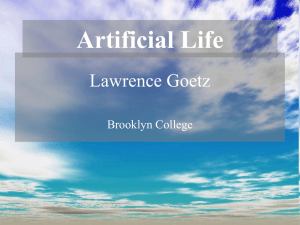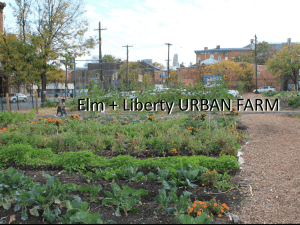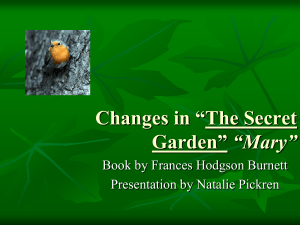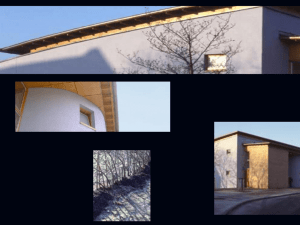artificial soundscape approach to noise pollution in urban areas
advertisement
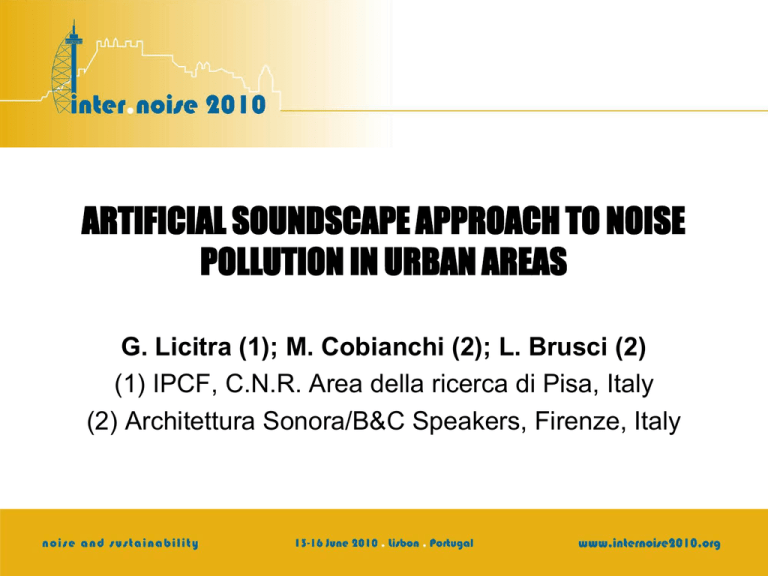
ARTIFICIAL SOUNDSCAPE APPROACH TO NOISE POLLUTION IN URBAN AREAS G. Licitra (1); M. Cobianchi (2); L. Brusci (2) (1) IPCF, C.N.R. Area della ricerca di Pisa, Italy (2) Architettura Sonora/B&C Speakers, Firenze, Italy OVERVIEW I) THE SOUNDSCAPE APPROACH II) FROM THE ANALYSIS TO THE SYNTHESIS OF THE SOUNDSCAPE III) THE AUDIO SYSTEM AND ITS COMPONENTS IV) EXPERIENCES AND RESULTS V) OPEN POINTS AND FUTURE MODS VI)CONCLUSIONS I - THE SOUNDSCAPE APPROACH 1) In most urban areas, plans and actions aiming at SPL noise reduction are not viable. This is sometimes because of their invasiveness and aesthetic impact, or simply for reasons of economical or technical feasibility. 2) Plans and actions should be aimed more to the perceived annoyance than the mere SPL noise reduction to effectively improve a citizen's acoustic comfort. 3) These considerations lead us to what is usually called "the soundscape approach", a paradigm widely accepted and used for the characterization and preservation of existing situations, but not yet fully exploited. A large scientific debate is going on, as in the Cost Action (TUD Action TD 0804). II - FROM THE ANALYSIS TO THE SYNTHESIS OF THE SOUNDSCAPE This step involves the participation of different professionals like urban planners, acousticians, psychologists and sociologists to define the acoustic features of the area under study, relying on data such as the activities which have to be encouraged or discouraged, the user’s expectations etc. The action plan is based on the generation of artificial soundscapes which are able to restore and redevelop the degraded soundscapes. III - THE AUDIO SYSTEM AND ITS COMPONENTS The loudspeakers The Artificial Soundscape Generation Software The building blocks of the artificial soundscape, i.e. the soundtracks III - THE LOUDSPEAKERS They are specifically developed and produced to dialogue with and become part of the existing context, from the architectural, landscape and naturalistic point of view. They are responsible to produce a uniform and undistorted sound-field inside the area, without disrupting the aesthetic features of the environment in which they are placed. III - THE LOUDSPEAKERS III - THE ARTIFICIAL SOUNDSCAPE GENERATION SW This software processes in real time the soundtracks chosen among a meta-compositive database to make them effective for the purpose of noise masking. IT ISN’T AN ACTIVE NOISE CONTROL PROCESS Thus the post-operam SPL will be necessarily higher than the ante-operam value, we’re currently working with 3 dBA Leq gap, but the reduction in the perceived annoyance greatly compensate for the SPL increase. III - THE ARTIFICIAL SOUNDSCAPE GENERATION SW / SPECTRAL AND SPATIAL MASKING The main principles employed for the masking effect are: 1) Spectral and spatial masking 2) Cognitive/cultural masking Spectral masking is the well known psychoacoustic phenomenon by which each perceived sound creates a bell shaped inaudibility area in the frequency/sound level plane, depending on both spectral content and time evolution. However, in a 3D sound-field the spectral masking can only be effective if the angle by which the listener perceives both the noise and the masking sound is below a certain threshold. III - THE ARTIFICIAL SOUNDSCAPE GENERATION SW / SPECTRAL MASKING III - THE ARTIFICIAL SOUNDSCAPE GENERATION SW / COGNITIVE AND CULTURAL MASKING Cognitive/cultural masking is strongly related to the social and cultural context and to the expectations of the user who is within the area "hic et nunc". It is based on the "informative content" of the soundscape: an interesting signal will cause an attention shift, relegating the noise to the perceptual background. Nevertheless, an "out of context" sound, i.e. a sound completely unrelated to the "ante operam" soundscape, will easily result in an alarming, alienating, or unwanted aesthetic content. III - THE ARTIFICIAL SOUNDSCAPE GENERATION SW MACRO-ARCHITECTURE III - THE SOUNDTRACKS The audio soundtracks in the meta-compositive database are extremely site-specific, and are composed and designed around the data available from a previous characterization of the area under study. They can also be designed to encourage or discourage defined activities (relax, playing, social relations etc.) and induce different and unpredictable postural gestures. All soundtracks are highly involving and immersive, taking advantage of surround sound techniques and 8/16 channels multichannel systems. POSTURAL EXPERIENCES IV - EXPERIENCES AND RESULTS - Sonic Garden La Limonaia dell'Imperialino, Firenze (2004-2007) - Square G. Caen, Paris, 2006 - Sonic Garden @ Parco Sempione, Milano, June 2009 - Sonic Garden @ Villa Aldobrandini, Roma, May 2010 - Sonic Garden @ Castello di Bisarno, Firenze, June 2010 Sonic Garden La Limonaia dell'Imperialino, Firenze (2004-2007) Square G. Caen, Paris, 2006 Sonic Garden @ Parco Sempione, Milano, June 2009 Sonic Garden @ Villa Aldobrandini, Roma, May 2010 Sonic Garden @ Castello di Bisarno, Firenze, June 2010 IV - EXPERIENCES AND RESULTS Different assessment strategies have emerged. Some related to the use of psychoacoustic descriptors or even non acoustic ones (through surveys and interviews). The increased acoustic comfort has been proven in previous sonic garden experiences [Licitra, Memoli - Euronoise 2006]. It is also clear that the average SPL, Leq, or similar quantities are not useful in those conditions, while new descriptors such as Slope are much more informative and correlated to user's perceived annoyance [Licitra, Memoli - Internoise 2005]. IV - EXPERIENCES AND RESULTS IV - EXPERIENCES AND RESULTS /2 A new scientific and systematic collaboration with the National Council of Research has just been started to define a procedure to objectively assess the effects of artificial soundscapes, in order to cope the noise polluted areas under study. The first area chosen as case study is the New Sonic Garden at the Bisarno Castle, Florence (IT). This area has been chosen both for its representativeness of a typical and beautiful Italian garden and for its proximity to a busy roadway. IV - EXPERIENCES AND RESULTS V - OPEN POINTS AND FUTURE MODS - How to deal with impulsive events without alarming the users? - How to deal with very high SPL without engaging a “loudness war”? - Blind source separation and source recognition to consider the level only of the undesired noise, while ignoring desired sounds like bird singing, human voices etc. - Non acoustic variables to consider in the artificial soundscape generation process, like weather, number of users, etc. VI - CONCLUSIONS The experience of recent years has shown that there is great potential for the artificial soundscape approach as a tool to restore acoustically degraded locations. The promising ongoing research, aimed at the development of an intelligent artificial soundscape generation system and its objective and systematic assessment, will allow the redevelopment of those areas, otherwise condemned to an uncomfortable annoyance if not even a total lack of human presence. VI – CONCLUSIONS /2 A new and effective tool to cope with sound polluted areas re-design is now available: THE GROWTH OF THIS TOOL WILL BE STRICTLY RELATED TO HOW MUCH THE COMPETENT AUTHORITIES WILL SUPPORT THE NEW APPROACH PERMITTING TO REALIZE SOME CASE STUDIES.
